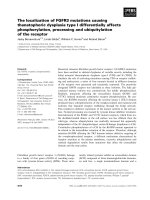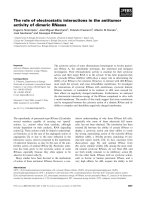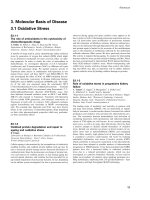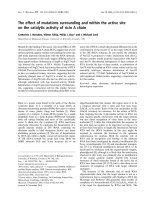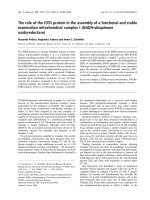Báo cáo khoa học: "The last 10 years have witnessed considerable progress in molecular biology, trangenesis and genomics, and the assessment of wood and end-product properties" potx
Bạn đang xem bản rút gọn của tài liệu. Xem và tải ngay bản đầy đủ của tài liệu tại đây (50.4 KB, 1 trang )
Foreword
The last 10 years have witnessed considerable progress in
molecular biology, trangenesis and genomics, and the assess
-
ment of wood and end-product properties. Genetic improve
-
ment programmes for wood properties and other
characteristics of economic and ecological importance,
which have traditionally focused on phenotypic assessments
(e.g. of wood density, volume and adaptive traits), may in fu
-
ture be mainly concerned with new traits and/or genes that
make it possible to reduce the cost of breeding. The possibil
-
ity has also emerged of the mass propagation of forest trees
by somatic embryogenesis, for the rapid deployment of supe
-
rior genotypes.
The Wood, Breeding, Biotechnology and Industrial Ex
-
pectations (WBB) conference washeld from 11–14 June2001
in Bordeaux (France). WBB was organized by INRA (Équipe
de Génétique et Amélioration des Arbres Forestiers), and
sponsored by the following organizations: The European Un-
ion (n
o
QLAM-2000-00226), INRA, AFOCEL, CTBA,
Conseil Régional d’Aquitaine and Smurfit Comptoir du Pin.
This multidisciplinary conference assembled 210 scientists
from state institutions, universities and industry in 28 coun-
tries and covering a wide spectrum of expertise in genetics,
biotechnology and wood sciences. WBB was a joint meeting
between a group of European Union funded projects dealing
with the general topic of the conference (Wood, Breedingand
Biotechnology), the 9th Conifer Biotechnology Working
Group and the IUFRO 5.01.02 and 2.04.00 working parties.
The objectives of WBB were: (1) to provide a forum for
presentations and discussions on the introduction of
biotechnologies (molecular and cellular biology, somatic
embryogenesis, molecular genetics) and wood quality traits
in tree breeding programs; (2) to identify, with the partici
-
pants from industry, the main topics to be investigated in the
future in order to meet both the increasing demand for wood
and the environmental standards expected of wood process
-
ing industries and (3) to provide an opportunity for numerous
contacts and stimulate exchange for new collaborations be
-
tween participants.
The conference wasdivided into topic sessionsas follows:
Topic 1: Methods for the assessment of wood and fibre prop
-
erties. Non-destructive evaluation and recent progress in the
rapid assessment of wood and fibre properties. Modelling
wood properties at different stages in the forestry – wood
chain (e.g. wood on standing trees, engineered wood prod
-
ucts).
Topic 2: Natural variation and quantitative genetics of wood
and fibre properties; environmental influences onwood prop
-
erties. Inheritance and genetic variability of wood properties,
genotype-environment interactions, age-age relationships,
genetic relationships between adaptive, growth and form
traits and wood properties. Interaction between forestry prac
-
tices and genetic variation.
Topic 3: Wood and fibre properties for particular end uses.
Relationships between basic wood properties and the perfor
-
mance of end products, impact of wood properties on pro
-
cessing, inheritance and genetic variation of end product
properties, economic weights.
Topic 4: Genome analysis, genetic mapping, QTL detection,
candidate genes and proteins, exploitation of macro and mi-
cro-synteny.
Topic 5: Somatic embryogenesis and tissue culture. Recent
advance in clonal propagation, including the opportunity of-
fered by cryo-conservation. Propagation systems to produce
plants of high quality.
Topic 6: Molecular biology and genetic engineering.
Topic 7: Molecular diversity and application of molecular
markers for seed and plant material certification.
Overall, 10 invited and 89 voluntary papers were
presented, as well as 72 posters (abstracts available at
The present
issue of Annals of Forest Science has been compiled from
some of the communications presented during the confer
-
ence. A total of 29 papers are included in this special issue of
AFS. All manuscripts were peer-reviewed according to the
editorial rules of the journal.
This conference would not have been possible without the
assistance of Marie-Pierre Reviron, Jean-Marc Frigerio, the
wonderful students of INRA Pierroton and great support
from Valérie and Marc-Antoine. For help with the prepara
-
tory work for the conference, we thank Danièle Pouvreau,
Isabelle Lebayon, Marc Pâques, Luc Harvengt, the members
of the GENIALITY group, the international organizing and
scientific committees and the chair persons. Finally, we
thank all the contributors to this special issue, the conference
sponsors for their financial support and acknowledge the
work provided by the reviewers.
Co-editors of the Proceedings
C. Plomion
C. Cahalan
Ann. For. Sci. 59 (2002) 461
© INRA, EDP Sciences, 2002
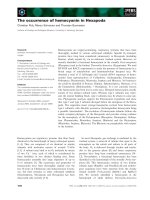
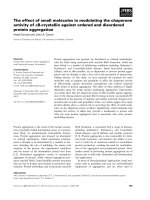
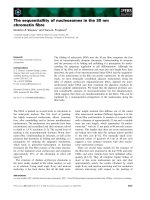
![Tài liệu Báo cáo khoa học: The stereochemistry of benzo[a]pyrene-2¢-deoxyguanosine adducts affects DNA methylation by SssI and HhaI DNA methyltransferases pptx](https://media.store123doc.com/images/document/14/br/gc/medium_Y97X8XlBli.jpg)
